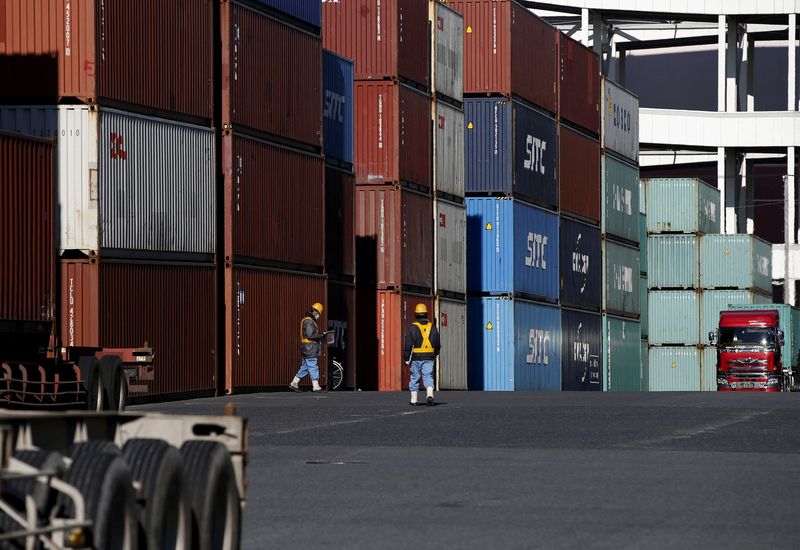
©Reuters. FILE PHOTO: Workers walk in a container area at a port in Tokyo, Japan, January 25, 2016. REUTERS/Toru Hanai/File Photo
By Tetsushi Kajimoto
TOKYO (Reuters) – Japan’s exports rose more than expected in January, boosted by shipments of cars and related parts to the United States and Chinese demand for chip-making equipment, even as industry sentiment worsened. industrial added concerns about broader economic weakness.
Finance Ministry data released Wednesday showed Japan’s exports rose 11.9% in January from the same month a year ago, faster than the 9.5% rise economists expected in a survey Reuters and growth of 9.7% in the previous month.
While buoyant exports could ease some worries about further economic declines, the Reuters Tankan survey showed manufacturing business morale soured sharply in February, with pessimists outnumbering optimists for the first time in 10 months.
Some analysts have cautioned against putting too much weight on the company’s export data, pointing out that the 29.2% year-over-year increase in China-bound shipments was partly distorted by comparisons with 2023, with the period quieter than the Lunar New Year in January last year.
Meanwhile, the weakening yen has likely played a greater role in raising the value of exports, rather than strengthening demand.
“The U.S. economy is slowing and Europe is in recession, so there is no reason to be optimistic about Japanese exports weakening as a trend,” said Takeshi Minami, chief economist at Norinchukin Research Institute.
The set of indicators followed data last week that showed Japan unexpectedly slipped into recession in the fourth quarter and lost its place as the world’s third-largest economy to Germany.
Speculation has mounted since last year that the Bank of Japan could abandon its negative interest rate policy as early as March or April if wage and price growth recover sufficiently.
However, recent weak data has fueled concerns that Japanese businesses may become reluctant to raise wages enough to achieve stable, sustainable inflation in a country that has been mired in a deflationary mindset for more than a decade.
Reuters Tankan Indexes found that manufacturer sentiment fell to minus 1 in February from plus 6 the previous month, the first negative reading since last April. The index is expected to rebound to plus 6 in May.
Trade data also showed imports fell 9.6%, compared to the median estimate of an 8.4% decline.
The trade balance recorded a deficit of 1.758 trillion yen ($11.73 billion), compared to the median estimate of a deficit of 1.926 trillion yen.
($1 = 149.9200 yen)